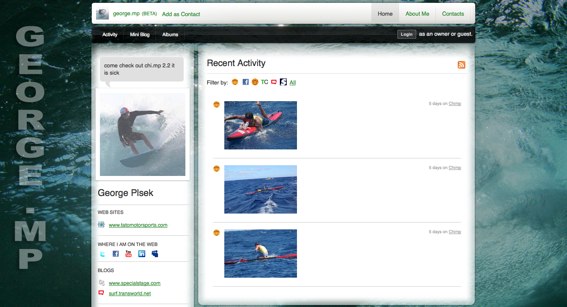
Are you a chump for putting all your data on social networking and media sites and not having any real control over it? chi.mp thinks so. chi.mp is a service for owning and managing your online identity, and is now open to the public. Previously in private beta, chi.mp ( which stands for Content Hub & Identity Management Platform), allows people to bring together their presence on from all over the web in one place. Chi.mp basically gives users (for free) their own domain and Web site and gives them full ownership over the content, letting them create a “social hub.”
chi.mp is kind of like having your own FriendFeed. It offers users a free “.mp” domain name, allowing users to get a free web site that includes Open ID, social network profiles, an activity stream, a blog, photo albums and other tools to import content and contacts from Twitter, Flickr, Gmail or Yahoo, and any site with RSS or Atom feeds. chi.mp also includes a contact management system called the ‘Ultimate Black Book’, a tiered privacy tool called ‘Personas’ and the ability to publish and push content to other sites and social networks, such as Facebook.
The ‘Personas’ feature on chi.mp lets owners create multiple versions of themselves for different audiences. This feature is useful when wanting to differentiate your identity for your work place, for instance, from your online identity for friends. And its comforting to have full ownership over your profile and information about you on the web. Ownership over users content can be a complicated issue, according to Facebook founder and CEO Mark Zuckerberg. ch.imp is also somewhat similar to .Tel’s service of aggregating personal information via a domain name. But .Tel doesn’t provide a free service to mashup, import and organize your online information like chi.mp.
Of course there are plenty of other social network and web information aggregators like Nomee (a desktop app) and FriendFeed (a web application) but chi.mp’s key difference is the user’s ownership over the domain and the content. Is that enough to get people to use it, though? The nice thing about FriendFeed, for instance, is that other people actually go there.
